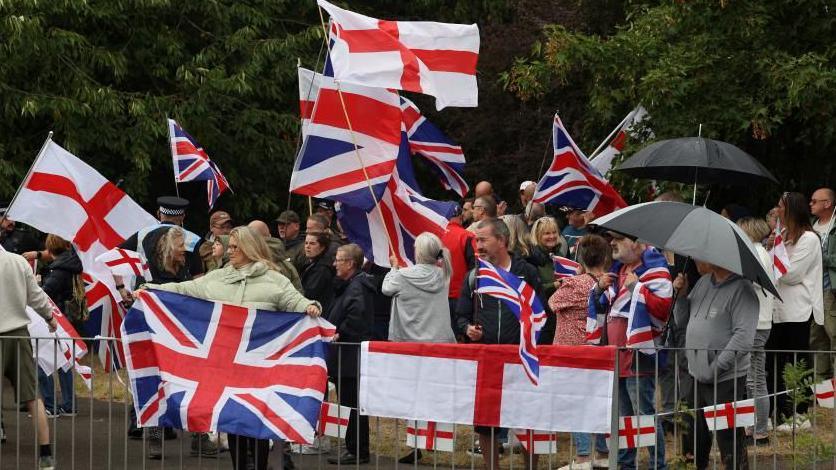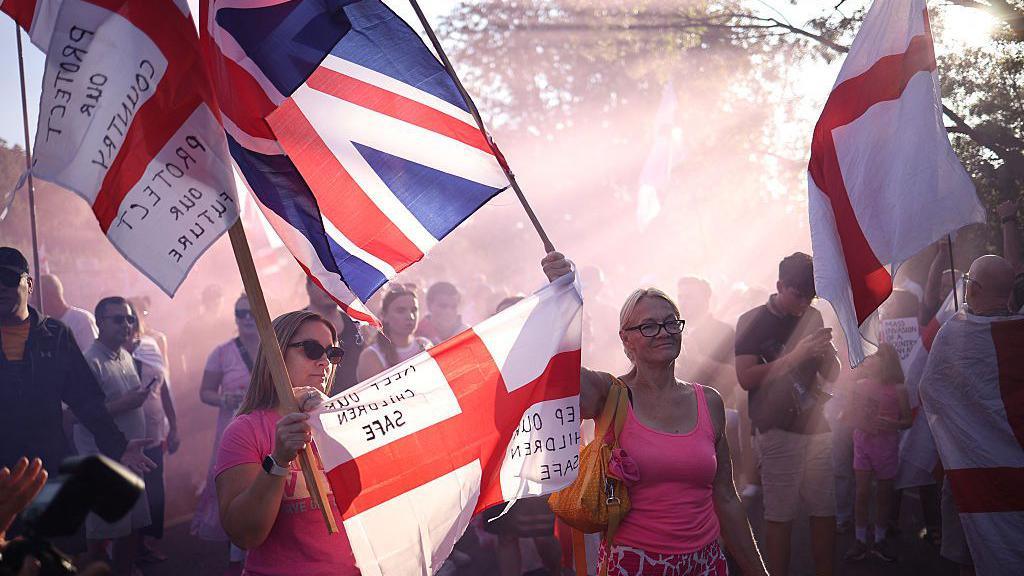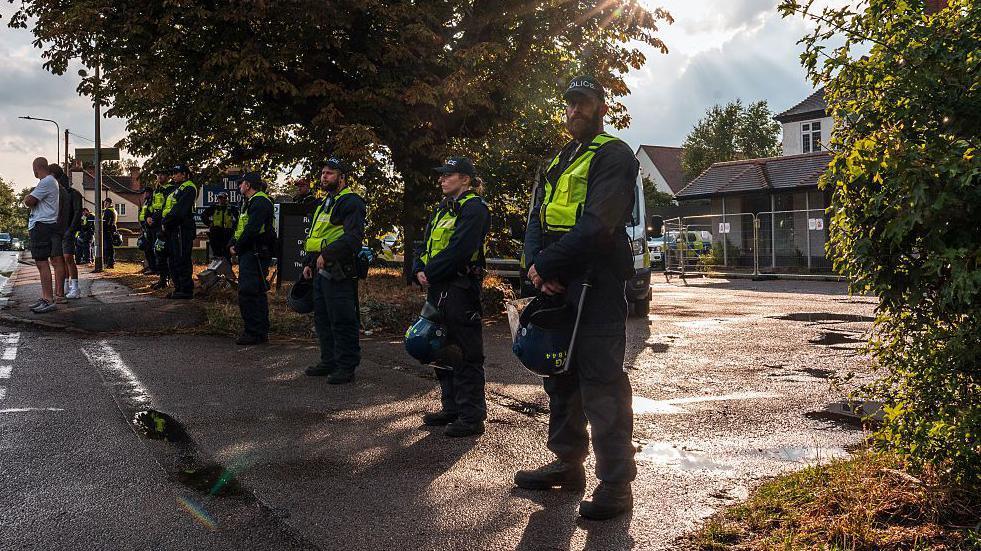Councils still plan asylum hotel legal action despite Epping ruling

Protesters gathered in several areas on Saturday, including Warrington
- Published
Some councils say they are still pursuing legal action to stop asylum seekers from being housed in hotels in their areas, despite a Court of Appeal ruling.
The court on Friday overturned a temporary injunction which would have prevented asylum seekers from being housed at The Bell Hotel in Epping, seen as a possible precedent for legal challenges elsewhere.
Two councils told the BBC they would keep pursuing legal action. Epping Forest District Council, which obtained the injunction, said it was looking at options which included an appeal to the Supreme Court.
Reform UK said all 12 councils it controlled should explore legal options to stop asylum seekers being housed in local hotels.
More protests against hotels housing asylum seekers, as well as counter-demonstrations, took place in England and Scotland on Saturday.
The Met Police say five people were arrested at a protest near Heathrow Airport. Two anti-asylum groups marched to a Crowne Plaza hotel and some men in masks attempted to enter the building through the rear entrance, damaging security fences, the force said.
Demonstrations took place in locations including Warrington, Skegness, Barnwood in Gloucester and Portsmouth.
In Scotland, hundreds of pro and anti-immigration demonstrators gathered outside a hotel housing asylum seekers in Falkirk.
Meanwhile, police said Section 35 dispersal order has been put in place in Epping, allowing officers to direct people to leave the area and not return if they suspect they may cause disorder.
Two men have been charged following a protest in Epping on Friday after the Court of Appeal ruling - one with assaulting an emergency worker and the other with failing to provide a specimen.
A third man arrested on suspicion of violent disorder remains in custody, Essex Police said on Saturday afternoon.

A string of demonstrations have been held outside The Bell Hotel in Epping this summer, including this protest in early August
The Times reported, external that it understood at least 13 councils planned on pressing ahead with legal action, following Friday's ruling.
Kemi Badenoch urged Conservative-run councils pursuing legal action to "keep going," and said advice would be issued to all Conservative councillors following the ruling.
After the ruling, Border Security and Asylum Minister Dame Angela Eagle said the government would "stop using hotels, which aren't a sustainable solution, by the end of this Parliament".
She said the judgement on the legal challenge, which was brought by lawyers for the Home Office and The Bell Hotel, would allow the government to do so "in a planned and orderly fashion".
On Satuday, the prime minister said that he would "not reward illegal entry" to the UK.
"If you cross the Channel unlawfully, you will be detained and sent back," Sir Keir Starmer said in a post on X.
How many people cross the Channel in small boats?
- Published22 October
Migration: How many people come to work and study in the UK?
- Published2 September
The leader of Reform-controlled West Northamptonshire Council said Friday's ruling did not change its plans to take legal action regarding hotels in the area, which he said were "already under way".
He added: "We will continue to do everything we can within our powers to address our residents' concerns over these hotels and keep them safe."
Hertfordshire's Conservative-run Broxbourne Council also said it would press on with pursuing legal action.
Councillor Jim Clune told BBC Radio 4's Today programme: "We have grave concerns that from a planning perspective, the hotel or the premises is not being used as set out when planning permission was given."
In its original case, Epping Forest had argued that The Bell Hotel had become a public safety risk as well as an alleged planning law breach, arguing it had stopped functioning as a true hotel.
The leader of Epping Forest District Council, Chris Whitbread, told the BBC it was "looking at all options, including appealing to the Supreme Court".
A full High Court hearing to decide on a permanent injunction for The Bell Hotel is expected in mid-October, but Whitbread said the Conservative-run council would meet on Monday to plan its next steps.
Barrister Chris Daw KC told BBC 5 Live Breakfast that Epping Forest was "not going to succeed in the Supreme Court", should it take its case there.
Whitbread said in response that he took his remarks "on board".
He later told BBC Breakfast that "people are very disappointed" by the judgement and that he expected protests near the hotel to continue.
"I don't think it will change, people want that hotel closed" he said, urging people to demonstrate peacefully.

Police have been present at protests outside The Bell Hotel
In his ruling on Friday, Lord Justice Bean said the High Court's decision to award the injunction was "seriously flawed in principle" and had failed to consider the consequence of relocating 138 asylum seekers who would have been forced to leave The Bell Hotel by 12 September.
He also said it was "worrying" that the council's legal team cited protests outside the hotel as a reason it was seeking the original injunction.
Lord Justice Bean said in his ruling: "If an outbreak of protest enhances a case, this runs the risk of acting as an impetus for further protests - some of which may be disorderly - around asylum accommodation."
"There is a risk of encouraging further lawlessness."
The protests began after an asylum seeker housed at the hotel was arrested and subsequently charged with several offences, including the alleged sexual assault of a 14-year-old girl. Hadush Kebatu denies the offences and has been on trial.
The chief executive of the Refugee Council said the Court of Appeal's ruling did not "solve the problems we're facing".
Enver Solomon told BBC Breakfast on Saturday: "It doesn't address the fact that the taxpayer is having to pay millions of pounds a day for hotels, and those that are in the hotels feel they've got a target on their back."
He said the government had to "move much faster" to end the use of hotels to house asylum seekers and suggested it put a plan in place "to close hotels in the coming months".
He added: "Our view is that we shouldn't be using hotels. They have become a flashpoint for community concern, but also for far-right targeting as well."
The number of asylum seekers being housed in hotels rose slightly to 32,059 in the year to June, according to Home Office data.
This was higher than when Labour came to power, but well below a peak of 56,000 in September 2023 under the Conservatives.
Meanwhile, a record 111,000 asylum applications were made to the UK in the same year - a 14% increase from the previous year - but the government is processing more cases than before the general election.
Get in touch
How have you been affected by the issues raised in this story? Tell us about your experience.